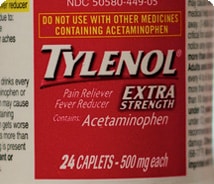Tylenol Liver Safety Concerns Highlighted in ProPublica Report
A recent investigative report by the public interest news group ProPublica highlights how McNeil Healthcare, a subsidiary of Johnson & Johnson, has delayed warnings about the risk of Tylenol liver damage for years, even fighting against educational campaigns designed to keep consumers safer.
The Tylenol liver injury lawyers at Saiontz & Kirk, P.A. represent individuals nationwide who are pursuing a claim against Johnson & Johnson and McNeil over their failure to adequately warn about the side effects of acetaminophen, including allegations that the drug makers placed their desire for profits before the health of consumers by providing false and misleading information about the Tylenol liver safety.
The ProPublic report, titled “Use Only As Directed” provides an in-depth look into the long history of Tylenol, outlining how McNeil and the FDA failed to protect consumers for at least three decades from a risk of acute liver failure that was well known.
In just the time period of 2000 through 2010, more than 1,500 people died due to acetaminophen overdose, and it has been identified as the leading cause of liver failure in the United States.
Only in recent years have steps been taken to reduce the maximum recommended dosage, provide more accurate warnings about the liver safety of Tylenol and ensure that consumers are aware of the risks associated with mixing Tylenol and other acetaminophen products.
Tylenol Liver Risks
The FDA and McNeil Consumer Healthcare have known about the dangers of Tylenol liver risks since at least 1977, when a panel of FDA experts called for warnings of “severe liver damage” be added to Tylenol labels. However, McNeil and the FDA did not act on those warnings until 2009. Four years ago the agency approved even more measures to protect consumers from acetaminophen overdose, but many of those steps still have not been implemented.
McNeil has fought numerous efforts to add additional warnings to Tylenol products throughout the years, as outlined in the ProPublica report. The company has also opposed dosage restrictions and even resisted an ad campaign that was simply deigned to make sure people were aware of the dangers associated with Tylenol and acetaminophen.
McNeil and Johnson & Johnson have devoted hundreds of millions of dollars to advertising Tylenol in an attempt to convince consumers that it safe, often referring to Tylenol as “trusted” by hospitals. However, the ProPublica report points out that McNeil employees have acknowledged that they purposefully avoided calling Tylenol “safe.”
Part of the Tylenol problem is the narrow window between when the drug is effective and an acetaminophen overdose. Just exceeding the daily recommended dosage by 25% over a few days can lead to liver damage and even death, according to the report. This is the difference of consumers deciding to take 3 pills instead of 2 to deal with a bad headache, or simply losing track of the time between doses.
As ProPublica writes:
About a quarter of Americans routinely take more over-the-counter pain relief pills of all kinds than they are supposed to, surveys show. That behavior is ‘particularly troublesome’ for acetaminophen, an FDA report said, because the drug’s narrow safety margin places ‘a large fraction of users close to a toxic dose in the ordinary course of use.’
Lawyers Reviewing Tylenol Liver Injury Lawsuits Nationwide
The product liability lawyers at Saiontz & Kirk, P.A. are reviewing potential Tylenol lawsuits for users of the pain medication throughout the United States diagnosed with liver damage or liver failure, which often results in the need for a liver transplant. Potential cases are also being reviewed for individuals who have suffered severe skin reactions from Tylenol, including Stevens-Johnson Syndrome (SJS) or Toxic Epidermal Necrolysis (TEN).
Evidence continues to mount in support of allegations that the failure of the makers of Tylenol to provide adequate warnings caused hundreds, if not thousands of serious liver injuries. As a result, financial compensation may be available.
All claims are handled by our Tylenol attorneys under a contingency fee agreement, which means that there are never any out of pocket expenses to hire our law firm and there are no fees or expenses unless a recovery is obtained.
To review a potential claim for yourself, a friend or family member, request a free consultation and claim evaluation.



No Comments • Add Your Comments